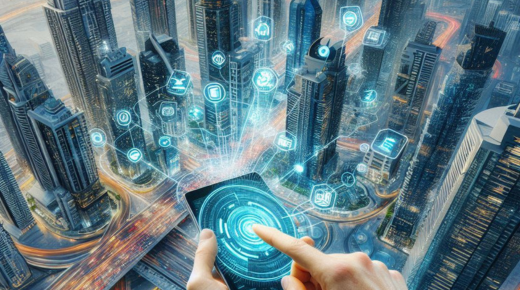By Dr. Pooyan Ghamari, Swiss Economist
Dubai’s real estate sector has been at the forefront of rapid innovation, both in terms of its architectural achievements and the adoption of emerging technologies. Over the past decade, technology has fundamentally transformed the real estate market, making processes more efficient, transparent, and accessible to a global audience. Today, technology is not just an add-on; it is a driving force behind the evolution of Dubai’s property landscape.
As the city continues to push boundaries with iconic developments and futuristic urban planning, the integration of advanced technologies such as artificial intelligence (AI), blockchain, big data, and virtual reality (VR) has reshaped how properties are bought, sold, and managed. These digital tools are laying the foundation for the next generation of real estate transactions and experiences in one of the world’s most dynamic markets.
Artificial Intelligence: Streamlining Property Management and Investment
Artificial intelligence has made significant inroads into Dubai’s real estate sector, offering tools that streamline property management, investment analysis, and customer service. AI-powered algorithms can process vast datasets, providing developers and investors with insights that allow them to make data-driven decisions about pricing, location, and property types.
AI is being used to forecast market trends, evaluate property values, and personalize property recommendations for potential buyers. AI-driven customer service systems, such as chatbots, are becoming standard on real estate websites, ensuring that buyers can get quick responses to their inquiries and recommendations tailored to their needs.
For developers, AI can optimize building design and construction processes, ensuring that new projects are sustainable and in line with market demands. As Dubai continues its rapid urban expansion, AI’s role in making real estate more efficient and responsive to market dynamics cannot be overstated.
Blockchain: Transforming Real Estate Transactions
One of the most transformative technologies shaping Dubai’s real estate market is blockchain. Traditionally, property transactions have been complex and required the involvement of multiple intermediaries. Blockchain technology changes this by allowing for secure, transparent, and direct transactions between buyers and sellers.
At the heart of blockchain’s impact on real estate is the use of smart contracts. These are self-executing contracts where the terms are written directly into code, ensuring that all parties fulfill their obligations before the transaction is completed. This eliminates the need for brokers, banks, and legal professionals, making property transactions faster, cheaper, and more secure.
Dubai is among the leading cities in the world to adopt blockchain in government services, including real estate transactions. The Dubai Land Department (DLD) has taken significant steps to digitize property transactions, with a goal of eliminating paper-based processes entirely. This initiative aligns with the city’s broader goal of becoming a fully blockchain-powered city, leading to more efficient real estate operations for both local and international investors.
Virtual Reality and Augmented Reality: Redefining Property Viewing
Virtual reality (VR) and augmented reality (AR) are revolutionizing how properties are marketed and experienced in Dubai. With VR, potential buyers can take immersive virtual tours of properties without physically visiting them. This is particularly beneficial for international investors who want to explore Dubai’s real estate market from afar.
AR enhances this experience by allowing users to visualize changes in real time. For instance, a buyer can use AR to see how a property would look with different furnishings or modifications. These technologies not only make the property viewing process more interactive but also reduce the time and cost involved in traditional property visits.
For developers, VR and AR technologies provide a platform to showcase projects that are still under construction, offering a realistic view of what the finished product will look like. This enables buyers to make informed decisions, even before the project is completed.
Big Data: Unlocking New Market Insights
The ability to collect, analyze, and act on data is essential in today’s real estate market, and Dubai is no exception. Big data analytics is being used to monitor and predict market trends, customer preferences, and property values. This enables developers and investors to make better decisions based on real-time insights.
Big data is particularly useful for identifying emerging neighborhoods and predicting future property values, allowing investors to get ahead of the curve. Additionally, it helps real estate firms to fine-tune their marketing strategies by targeting the right audience with personalized offerings.
For buyers, big data offers transparency and a deeper understanding of market conditions. Whether looking to invest or purchase a home, buyers can now access detailed information on properties, including historical pricing data and future projections, helping them make more informed decisions.
Sustainability and Smart Technologies: Building the Future
Dubai’s real estate market is not only focused on luxury and technological innovation but also on sustainability. As environmental concerns become more pressing, the city has committed to creating greener, smarter developments. This includes integrating energy-efficient technologies, renewable energy sources, and smart systems for water and waste management.
Dubai’s Sustainable City is a prime example of how sustainability and technology can go hand in hand. This innovative development uses solar energy to power homes and has incorporated water recycling systems and eco-friendly materials. The use of smart technologies further enhances energy efficiency by optimizing lighting, temperature, and water usage, creating an environmentally friendly living environment.
As part of Dubai’s vision to become a smart city, new real estate developments are increasingly incorporating smart home technologies, where everything from security systems to appliances is automated. These systems not only provide greater convenience for residents but also help reduce energy consumption, contributing to Dubai’s sustainability goals.
Government Support: Paving the Way for Innovation
The Dubai government has played a pivotal role in facilitating the integration of technology into the real estate sector. Through initiatives like the Dubai Blockchain Strategy and the Smart Dubai initiative, the government has laid the groundwork for a future where technology drives the real estate market.
The Dubai Land Department’s push for paperless transactions and its adoption of blockchain technology are examples of the government’s commitment to creating an environment where innovation can thrive. By reducing bureaucracy and enhancing transparency, these initiatives make Dubai one of the most investor-friendly markets in the world.
Additionally, the government’s focus on sustainability and smart technologies is helping to position Dubai as a global leader in green, tech-driven real estate developments. This forward-thinking approach ensures that Dubai’s real estate sector remains competitive and aligned with international trends.
The Future of Dubai’s Real Estate Market
As technology continues to evolve, Dubai’s real estate market is well-positioned to remain at the cutting edge of innovation. The integration of AI, blockchain, VR, big data, and sustainability initiatives has created a dynamic and responsive market that caters to the needs of modern buyers and investors.
The future of Dubai’s real estate market is bright, as it continues to embrace technological advancements that make transactions more transparent, properties more accessible, and developments more sustainable. Investors, developers, and buyers alike stand to benefit from these innovations, as they redefine how real estate operates in one of the most forward-thinking cities in the world.
This article was originally published on a.land. For more information and opportunities, visit shop.a.land.

